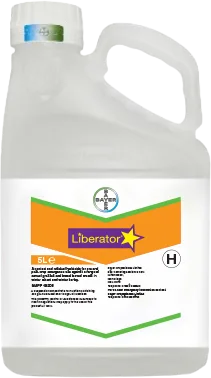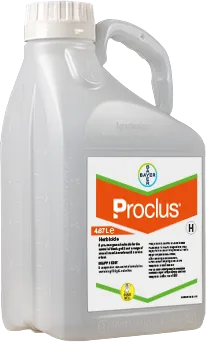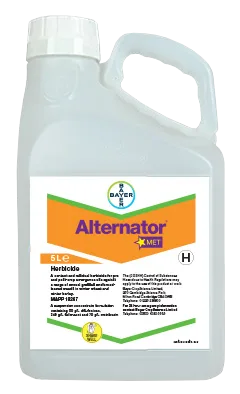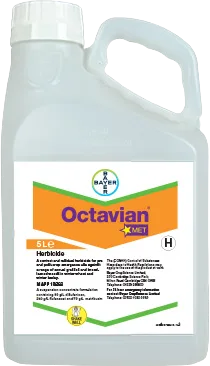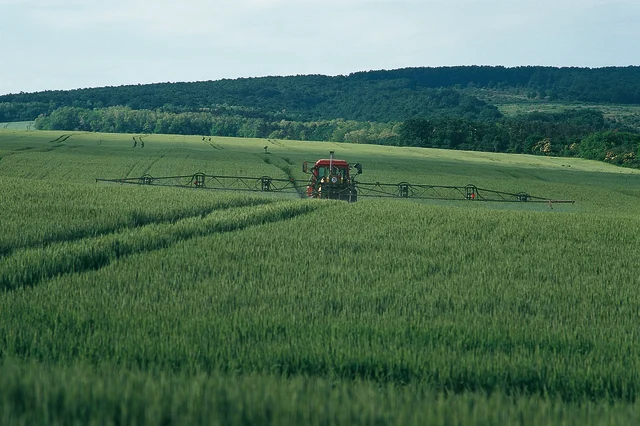Published on 12th September 2023
Weed Management
Optimising herbicide programs for effective autumn weed control in wheat and barley crops

The busy weeks in autumn when cereal crops are drilled and treated with pre-em herbicides have a huge impact on yield potential at harvest. High weed populations can cause yield losses and in the worst cases mean the field is redrilled in spring. Thankfully, there are numerous cultural and chemical controls that can be stacked together to achieve high-levels of control. Choosing the best programme depends on the specific situation on farm, read the guide below for more information to inform your decisions.
Cultural Controls for Weed Management
“Good cultural controls set the stage for the pre-em programme by reducing the number of weeds germinating in the crop. Fewer weeds mean that each plant is exposed to the optimum dose of active, meaning there is less pressure on the pre-em layer of herbicides,” says Bayer’s Matt Siggs.
Stale seedbeds, delayed drilling date and seed rates are the three key cultural controls variable ahead of autumn drilling. Ideally, there should be a higher level of soil disturbance in the top couple of inches when creating the stale seedbed compared to the final drilling pass. This will help to stimulate a good level of weed germination and so reduce the levels that germinate at the same time as the crop.
Delaying drilling into mid-October is a proven tactic to improve black-grass control, and to a slightly lesser extent when tackling ryegrass; however, autumn 2019 still looms in some farmers’ minds with the fear of a large area going undrilled. Read our delayed drilling guide for more information.
“The main flush of black-grass and ryegrass tend to be in late September and into early October, so for every week after the 1st October that you drill you are reducing the weed population pressure in the crop.”

Available Herbicide Actives
There are plenty of different actives available for farmers to use at pre-em and early post-em. Recent additions aclonifen and cinmethylin plus an improved label for metribuzin co-forms have improved efficacy and come from different mode of action groups which helps resistance management.
For a greater understanding of the available active ingredients and the rationale behind the recommendation to use multiple modes of action, we invite you to explore our guide 'Actives for Autumn'."

Black-Grass Control Strategies
Black-grass remains the biggest weed problem in cereal crops. In the recent Bayer Mode of Action Survey 2023, 74% of participants reported Black-grass being challenging control. Hence, choosing the best programme is essential, ideally paired with delayed drilling.
Flufenacet in the form of Liberator (flufenacet + diflufenican) is still an excellent foundation for black-grass control. It requires soil moisture to perform at its peak, so the cooler, damper conditions we’d associate with October are ideal. In low pressure situations, this may be enough but in high pressure situations adding Proclus (aclonifen) lifts control further.
“The aclonifen component copes well with dry conditions and also has an 80-day half-life. It is an ideal foil for flufenacet’s shorter half-life and preference for soil moisture, between them, you have all bases covered.”
To improve control further, more actives can be included in the mix, based on trials, Bayer suggests adding prosulfocarb. In trials carried out in a high-pressure situation, Liberator achieved approximately 70% control, adding Proclus lifted it to 80%. By adding prosulfocarb too, total control reached 90%.
Graph: Black-grass headcounts, 3 trials 2022-23

Bayer contracted trials x3 (2022-23) – Pre-em applied autumn 2022. Black-grass UTC plants counts avg = 248/m2
Using Metribuzin for Weed Control
Three-way co-forms of metribuzin, flufenacet and diflufenican are another option this season. The products Alternator Met and Octavian Met have been available for several seasons, but this year the label has changed. The full 1 l/ha rate can be applied until GS25 (previously there was a 30 September cut off, which diminished its value in many situations.)
Compared to straight Liberator at pre-em, the metribuzin products offer around 10% more overall control. The metribuzin products come into their own if applications are delayed until peri-em / early post-em. They suffer very little decline in performance compared to Liberator which is best applied at the true pre-em timing as shown in the graph.
Graph: Liberator v metribuzin co-forms at different timing

Managing Italian Ryegrass Resistance
Looking at it from a pre-em perspective, Italian ryegrass is probably the most dangerous grass-weed. There are instances of resistance to some common pre-em chemistry and the general rule is that you need to stack several different actives together to get good control and effectively manage resistance. This is reflected in pre-em trial results where stacking up Liberator + Proclus + prosulfocarb or tri-allate takes control from 70% to over 90%.
Graph: Italian ryegrass headcounts 2022-23

At the peri-em / early post-em timing, much like black-grass, using metribuzin offered a noticeable lift in control at both the 1 litre rate used for the main application or a ‘top-up’ 0.5 l/ha. For more information about resistance patterns in ryegrass visit our dedicated ryegrass page.
Tailoring Herbicide Programs for Brome Control
Target the herbicide programme to the typical germination window of the brome you are trying to control. Sterile brome and soft brome tend to have their peak germination in September, so a ‘black-grass type’ strategy will work well.
Rye brome, meadow brome and great brome typically germinate later, around November, meaning herbicides are very important to good control because most likely they will be germinating in the crop.
Please note, the above information refers to typical germination timing. Brome species also differ in how dormancy is induced by cultivation, but they group together in a different way. Read our brome guide for more information.
For the early germinating bromes (sterile and soft), stacking up actives at pre-em incrementally improves control.
Graph: Control of brome and wild oats by various herbicide stacks

Residual protection is vital for later germinating species (rye, meadow and great). Aclonifen has an average half-life of 80 days, which means it can persist and provide protection against brome. Trials results from Bayer’s Chishill weedscreen show an improvement against rye brome, meadow brome and wild oats from adding Proclus to Liberator.
Graph: Improved control by using Proclus against rye brome, meadow bromes and wild oats. (Chishill Weedscreen)

Weed Control Strategies for Winter Barley
Typically drilled earlier, effective grass-weed control in winter barley is often a challenge, with effective crop competition needing to do a lot of the work. Fewer actives are available in barley and the crop is more sensitive, so the big stacks used in wheat are not really viable. However, aclonifen is available to use in barley and combined with Liberator it delivers the best weed control available for both black-grass and Italian ryegrass.
Graph: Black-grass and ryegrass control in winter barely

As with any pre-emergence treatment, it's important to exercise caution on light, sandy soil types. However, on most soils, as long as the crop is well-established, there should be no concerns. To ensure successful results:
Drill consistently to at least 3.2 cm
Ensure seed is properly covered and the seedbed consolidated
Apply at the true pre-em timing within 48 hours
Avoid applications when extreme rainfall is forecast

